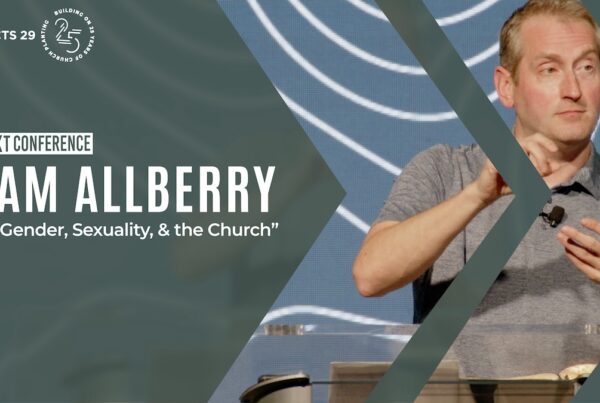Fragility and the Fear of Man
Most people struggle with the fear of man. This is why the Bible talks so much about it! But church planters may have a unique struggle in this area. It’s easy to fall into the fear of man when the early stages of church life seem so fragile.
Isn’t this odd? So many of us started out primed and ready for risk. Armed with big vision and big hearts we were willing to lay it all on the line to see a new work established in a new place. But once we launched it was easy to be lured into the lie of fearing people.
Why?
We can’t upset anyone because they might leave! What about our teeny, tiny budget? We can’t handle losing any givers. What about our need for childcare volunteers? We need a critical mass of attenders/givers or we might fold! What if my outside supporters get wind of a mass exodus from my church? What will I say then? Those people might drop off as well!
Certainly, pastors of large, established churches have struggles with fearing people, but, in contrast to the church planter’s struggle, the cause of those thoughts may not be due to a sense of fragility. Thankfully, God is faithful to give us a better word than the middle-of-the-night, restless lies that creep into our heads as we stare at the ceiling.
Consider this:
The fear of man lays a snare,
but whoever trusts in the Lord is safe.
Proverbs 29:25
Church planter, this is what God wants you to hear. The fear of man will catch, kill, and eat you.
This language of a snare conjures up images of trapping an animal so it can be caught, killed, and eaten – a practice that would have been familiar to ancient Israel, the intended audience of this proverb. Church planter, this is what God wants you to hear today. The fear of man will catch, kill, and eat you. You might feel fragile now, but anyone caught in a snare, with a hunter staring down on them, is truly fragile.
It doesn’t have to be this way. There is a way of safety and peace, and it is the way of listening and trusting.
Safety
When I ask my kids to trust me it often has to do with their safety. I may say to them, “Trust me, you don’t want to play in the street,” or, “Trust me, this group of friends is going to harm you in the long run,” or, “Trust me, failing to save your money will lead to problems.”
There is safety for my kids when they listen to and trust the word of their loving father. Other people may tell them things that contradict what I say. Whose word are they going to listen to and trust? God is asking us this same question in the proverb: who are we going to listen to and trust? Do you want a snare or do you want safety?
People may say, “If you lead us down this path we’ll leave the church!”
But God says, “I am with you always to the end of the age” (Matt. 28:20).
People may say, “If you continue to preach about Biblical sexual ethics you’ll lose your tax status as a church.”
But God says, “I charge you in the presence of God and of Christ Jesus, who is to judge the living and the dead, and by his appearing and his kingdom: preach the word; be ready in season and out of season” (2 Tim. 4:1-2).
People may say, “If you send church planters to our nation we’ll kill them.”
But God says, “And do not fear those who kill the body but cannot kill the soul. Rather fear him who can destroy both soul and body in hell. Are not two sparrows sold for a penny? And not one of them will fall to the ground apart from your Father. But even the hairs of your head are all numbered” (Matt. 10:28-30).
Who are we going to listen to and trust? Do you want a snare or do you want safety?
Safety is having Jesus near with no one else in sight, rather than having him absent in a full, unfaithful church
When Faithfulness Leads to Losing
As we wrestle with the answers to these questions, ask yourself this: Are you willing to lose your church and ministry? If being faithful meant that everyone would leave your church would you still pursue faithfulness? What does your gut say? Where do you lean? Towards the snare or towards safety?
Remember Jesus. He was the most faithful leader the world has ever known. Yet in the short term he lost everything in this world. Being naked and alone on a Roman cross was the ultimate ministry loss. Take heart: if that happens to you he will join you in the grieving. There is much safety in having Jesus near with no one else in sight rather than having him absent in a full, unfaithful church.
Hearing the Voice of Safety
How do we stir up a healthy trust in the Lord that silences the voices luring us into the snare of fearing people? Here are two simple suggestions that may be obvious but, sadly, are not practiced frequently enough.
First, God’s word must loom larger than the words of people. If we are good leaders, we’ll be surrounded by and listening to people all the time. Does our daily intake of God’s word shape how we hear and filter what they are saying? Consistent meditation upon God’s word has to be primary in this process. You may need to read Matthew 10 every day for a year to be consistently reminded by Jesus to “fear not; you are of more value than many sparrows” (Matt. 10:7).
Second, we must surround ourselves with godly elders who will help us discern when we are succumbing to the temptation to fear people more than God. We can’t lead our churches by ourselves. A plurality of elders (Acts 14:23, Titus 1:5) is intended to maintain the health of the church, and wisdom says that it should maintain the health of the staff pastor(s) as well.
God’s word must loom larger than the words of people.
Let’s be honest. Sometimes we don’t know what to do! For example, showing patience is often absolutely necessary, but at other times it could be a cover for inaction when inaction would be more comfortable. Which is driving you: godliness or fear of man? If it’s hard to tell, are there other godly, elder-qualified men in your life who can help you discern your heart in the midst of these challenges? Are you willing to listen to them? Without them we are sure to struggle.
A Caution
One final caution: demonstrating that you don’t fear people – but trust God – doesn’t equate to being bullheaded, harsh, or quick to command. It simply means that our primary orientation is to allow God and his word to be the defining voice to which we listen and take comfort. The voices, opinions, and approval of humans are always secondary to this. The former has to filter the latter; the other way around puts us in a snare that is sure to lead to disastrous results.
The principle of Proverbs 29:25 is that safety, security, and peace is found only in trusting the Lord. Who doesn’t want that as a church planting pastor? Trust in the Lord alone, and you’ll never be as fragile as you think you are because God is the one holding you together.











